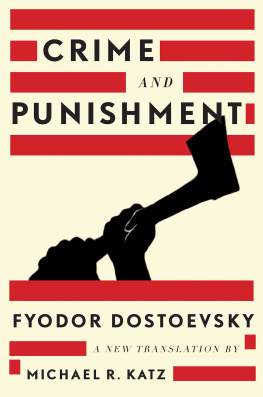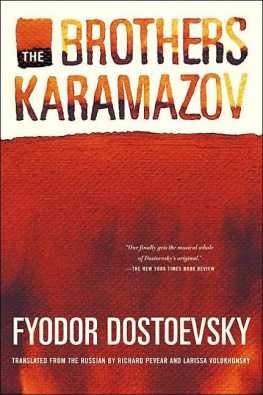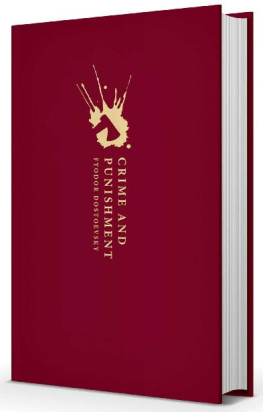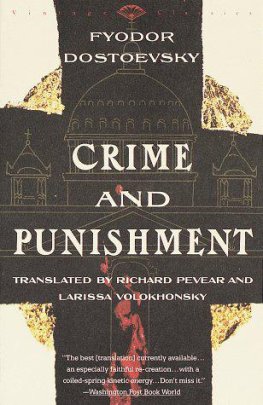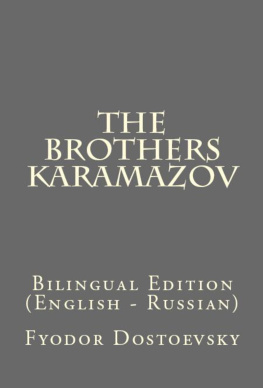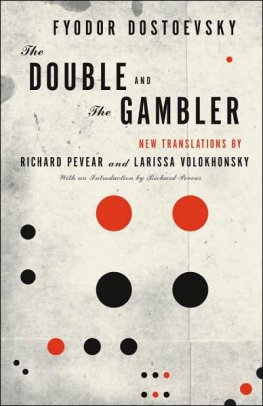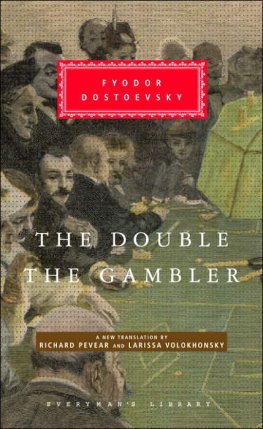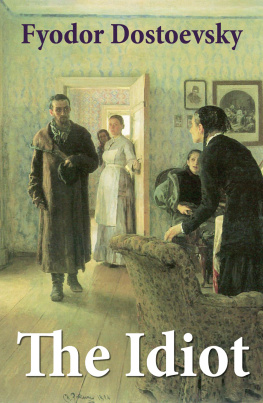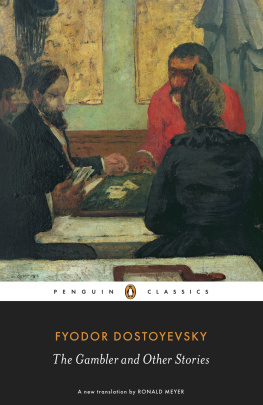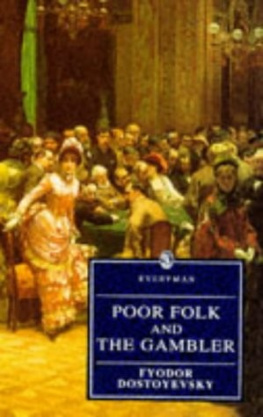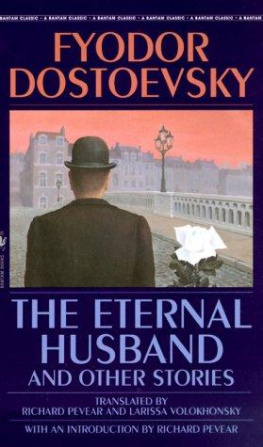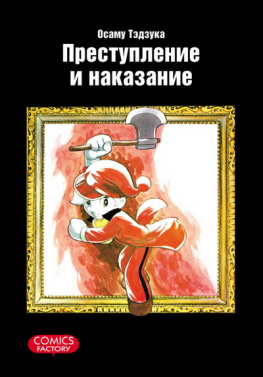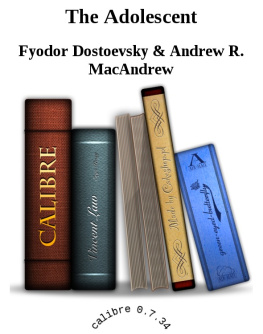
CONTENTS
____
INTRODUCTION
_____
In my view, all Russians are that way, or are inclined to be that way. If its not roulette, its something else like it.
Mr. Astley in The Gambler
Dostoevsky knew the passion for gambling very well; he was under its sway intermittently for some eight years, from his first trip abroad in 1863, where he had beginners luck at roulette in Wiesbaden, until the spring of 1871, when he was again in Wiesbaden and lost everything almost at once. At one point during those years he even gambled away his young wifes wedding ring. This last time, however, gripped by a sort of mystical terror, he went running in search of the local Russian priest, lost his way in the dark, and wound up not in front of the Orthodox church but in front of a synagogue. There, for whatever obscure reason, something decisive occurred. It was as though I had had cold water poured over me, he wrote to his wife. A great thing has been accomplished within me, a vile fantasy that has tormented me for almost ten years has vanished. And indeed he never gambled again.
For Dostoevsky, roulette was not only a means of getting rich suddenly, in two hours, without any work, as Alexei Ivanovich, the narrator and hero of The Gambler , says, but also some defiance of fate, some desire to give it a flick, to stick [his] tongue out at it. What fascinated him and possessed him was the poetry of the game of chance, the look into the abyss, the ultimate risk, a susceptibility that he saw as part of the unseemliness of the Russian character. But for Dostoevsky, as for his hero, that unseemliness had its positive side precisely in its impracticality; it was open to passion and to the unforeseeable. Perhaps Im a dignified man, Alexei Ivanovich says to Polina,
but I dont know how to behave with dignity. Do you understand that it may be so? All Russians are that way, and you know why? Because Russians are too richly and multifariously endowed to be able to find a decent form for themselves very quickly. Its a matter of form. For the most part, we Russians are so richly endowed that it takes genius for us to find a decent form. Well, but most often there is no genius
The problem of giving expression to this richly endowed but as yet unformed Russian character challenged Dostoevsky throughout his creative life. The old tutor Nikolai Semyonovich discusses it at the end of The Adolescent (Dostoevskys penultimate novel, published in 1875), implicitly drawing a comparison with the work of Tolstoy. Yes, Arkady Makarovich, he writes to the adolescent hero,
you are a member of an accidental family , as opposed to our still-recent hereditary types, who had a childhood and youth so different from yours. I confess, I would not wish to be a novelist whose hero comes from an accidental family! Thankless work and lacking in beautiful forms. And these types in any case are still a current matter, and therefore cannot be artistically finished.
Dostoevsky chose to be precisely that unenviable novelist. In 1863, when the idea of The Gambler first came to him, he wrote to his friend Nikolai Strakhov: The subject of the story isa certain type of Russian abroad. Note: Russians abroad were a big topic in the newspapers this summer. All this will be reflected in my story. And also in general it will reflect the contemporary moment (as much as possible, of course) of our inner life. Dostoevsky constantly tried to capture that contemporary moment or current matter which had not yet found expression. That is one of his most distinctive qualities as a writer. Five years later, after months of work on what would eventually become The Idiot , he wrote to another friend, the poet Apollon Maikov, about his idea of portraying a perfectly beautiful man The idea flashed even earlier in some sort of artistic form, but only some sort , and whats needed is the full form. Only my desperate situation forced me to take up this as yet premature thought. I took a risk, as at roulette: Maybe it will develop as I write! The gamblers defiance of fate, the risk of embarking on the unforeseeable, thus becomes a metaphor for Dostoevskys own artistic process.
The two short novels brought together here were both gambles, but of very different sorts and separated by a period of twenty years. The first, The Double , dates to 1845. Dostoevsky was then twenty-four years old and still intoxicated with the praise that had been showered on his first novel, Poor Folk , which had been finished in the spring of that year and shown in manuscript to the foremost critic of the day, Vissarion Belinsky. Thirty-two years later, in the January 1877 issue of his Diary of a Writer , Dostoevsky wrote of how Belinsky had summoned him a few days after that. Carried away with admiration, the fiery critic had cried out to him: This is the mystery of art, this is the truth of art! This is the artists service to truth! The truth is revealed and proclaimed to you as an artist, it has come as a gift. Value your gift, then, and remain faithful to it, and you will be a great writer! Dostoevsky had left Belinsky, as he says, in rapture.
I stopped at the corner of his house, looked at the sky, at the bright day, at the people passing by, and felt with my whole being that a solemn moment had occurred in my life, a break forever, that something altogether new had begun, something I had not anticipated even in my most passionate dreamsI recall that moment with the fullest clarity. And afterwards I could never forget it. It was the most ravishing moment of my whole life. When I was at hard labor, remembering it strengthened me spiritually. Even now I am ecstatic each time I remember it.
Belinsky had urged him to remain faithful to his gift. Another writer might have heeded that advice and continued on the successful path of portraying ordinary people in a sentimental manner and, as Konstantin Mochulsky put it, with a humanistic-philanthropic tendency (the humblest person is also a man). Instead, Dostoevsky wrote The Double .
Poor Folk was published on January 15, 1846, in the Petersburg Almanac , edited by the poet Nikolai Nekrasov, who had originally brought the manuscript to Belinsky. The Double , which Dostoevsky had begun during the summer of 1845, was published two weeks later, on January 30, 1846, in the journal Notes of the Fatherland . The closeness in time belies the great difference between them. Belinsky was reserved when Dostoevsky read several chapters from The Double at a soire in his apartment, to which a number of well-known critics and writers, among them Ivan Turgenev, were invited. In the February 1846 issue of Notes of the Fatherland , along with praise, he allowed himself some criticism of the novels prolixity. Other critics were harsher, accusing Dostoevsky of paraphrasing or even plagiarizing Nikolai Gogols Diary of a Madman or of making a hodgepodge of Gogol, E. T. A. Hoffmann, and other lesser-known writers. Above all, The Double seemed a betrayal of the realism to which Belinsky and his followers were devoted, and which they found so satisfyingly embodied in Poor Folk . We certainly were hoodwinked, my friend, with Dostoevsky the genius, Belinsky wrote later to the eminent critic Pavel Annenkov. The striking originality of The Double passed them by. But its publication was enough to marginalize Dostoevsky in Russian literature for many years to come, an exacerbation that may have driven him towards radical politics, ending in his arrest in April 1849 and his mock execution eight months later, followed by ten years of hard labor and Siberian exile. This first gamble was an artistic one, and it cost him dearly.


